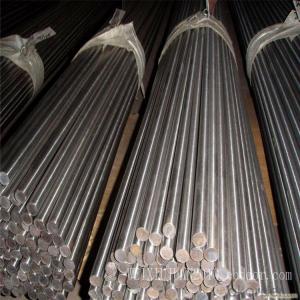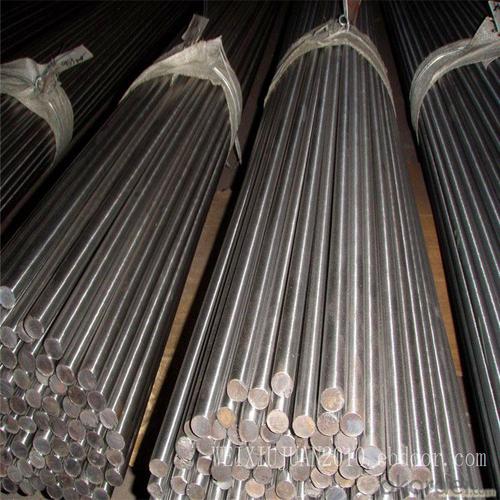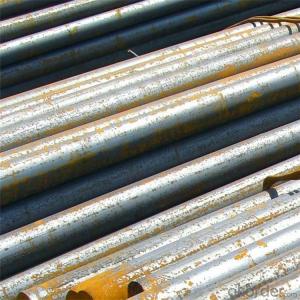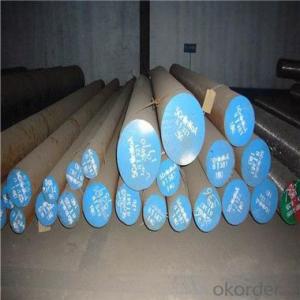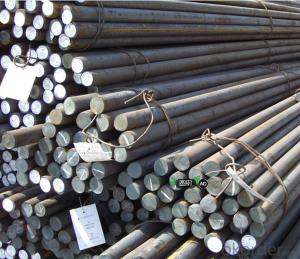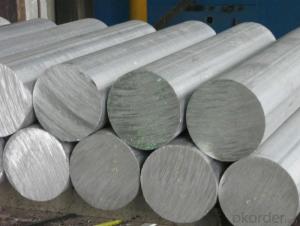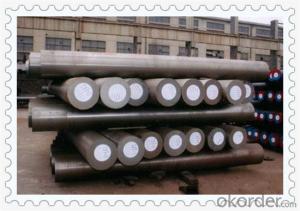Forged GB/AISI/JIS Standard 4130 1.7218 SCM430 25CrMo4 Half Round Steel Bar
- Loading Port:
- Tianjin
- Payment Terms:
- TT OR LC
- Min Order Qty:
- 100 m.t.
- Supply Capability:
- 500000 m.t./month
OKorder Service Pledge
OKorder Financial Service
You Might Also Like
Specification
Forged GB/AISI/JIS Standard 4130 1.7218 SCM430 25CrMo4 Half Round Steel Bar
Product Description of Forged GB/AISI/JIS Standard 4130 1.7218 SCM430 25CrMo4 Half Round Steel Bar
1. Steel grade: ASTM4140, SCM440, 42CrMo, DIN1.7225
2. Length: 6M-12M
3. Diameter: 16mm-300mm
4. Product range: round bar, flat bar, square bar
5. Technique: Hot rolled, forged, cold drawn
Specification of Forged GB/AISI/JIS Standard 4130 1.7218 SCM430 25CrMo4 Half Round Steel Bar
Material | SCM4140 | Round bar | Dia(mm) | 16-300mm |
Process | EAF + LF + VD + Forged + Heat Treatment (optional) | Length (mm) | Max 12m | |
Heat treatment | Normalized / Annealed / Quenched / tempered | Flat bar | Thickness(mm) | 8-500mm |
Delivery condition | Hot forged +Rough machined (black surface after Q/T)+ Turned (optional) | Width(mm) | 70-200mm | |
Test | Ultrasonic test according to SEP 1921-84 D/d | Length (mm) | Max 12m |
Chemical Composition of Forged GB/AISI/JIS Standard 4130 1.7218 SCM430 25CrMo4 Half Round Steel Bar
C | Si | Mn | Cr | Mo | P | S |
0.38~0.43 | 0.15~0.35 | 0.75~1.00 | 0.8~1.1 | 0.15~0.25 | ≤0.035 | <0.04< td=""> |
Photo Show of Forged GB/AISI/JIS Standard 4130 1.7218 SCM430 25CrMo4 Half Round Steel Bar
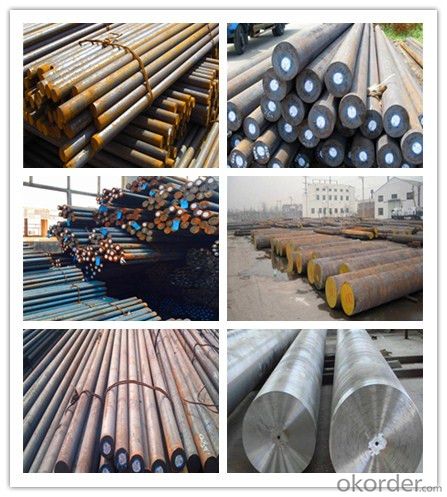
Packing and Delivery:
Packing in bundle package, or as customer's requirements.
Delivery Detail: 45 days after receiving the deposit.
Usage and Applications of Forged GB/AISI/JIS Standard 4130 1.7218 SCM430 25CrMo4 Half Round Steel Bar
1. Steel round bar is used in a large number of architectural and engineering structures. Or it can be used in construction of plants for the production of steel house frames, high-voltage transmission towers, bridges, vehicles, boilers, containers, ships, etc.
2. And we can use this kind of product on the performance of the mechanical parts if the demand is not very high.
3. Some special material steel round bar can be used for main shaft of steamer, hummer shank, with big section and supper force.
Company Information
CNBM International Corporation is the most important trading platform of CNBM group.
Whith its advantages, CNBM International are mainly concentrate on Cement, Glass, Iron and Steel, Ceramics industries and devotes herself for supplying high qulity series of refractories as well as technical consultancies and logistics solutions.


F A Q
1, Your advantages?
professional products inquiry, products knowledge train (for agents), smooth goods delivery, excellent customer solution proposale
2, Test & Certificate?
SGS test is available, customer inspection before shipping is welcome, third party inspection is no problem
3, Factory or Trading Company?
CNBM is a trading company but we have so many protocol factories and CNBM works as a trading department of these factories. Also CNBM is the holding company of many factories.
4, Payment Terms?
30% TT as deposit and 70% before delivery.
Irrevocable L/C at sight.
5, Trading Terms?
EXW, FOB, CIF, FFR, CNF
6, After-sale Service?
CNBM provides the services and support you need for every step of our cooperation. We're the business partner you can trust.
For any problem, please kindly contact us at any your convenient time.
We'll reply you in our first priority within 24 hours.
- Q: What are the different welding techniques for steel round bars?
- There are several different welding techniques that can be used for steel round bars, including shielded metal arc welding (SMAW), gas metal arc welding (GMAW), gas tungsten arc welding (GTAW), and flux-cored arc welding (FCAW). Each technique has its own advantages and disadvantages, depending on factors such as the thickness of the steel, the desired weld strength, and the specific application.
- Q: Can steel round bars be used for making cutlery or kitchen utensils?
- Certainly, cutlery or kitchen utensils can indeed be crafted using steel round bars. Steel is a favored option for kitchen utensils due to its robustness, endurance, and ability to resist corrosion. Nevertheless, the specific steel variant and the manufacturing process employed will determine its suitability for culinary purposes. Stainless steel, for instance, is highly recommended for cutlery and kitchen utensils due to its resistance to rust and stains, effortless cleaning, and non-reactivity with food. Moreover, steel round bars can be effortlessly molded and shaped into a myriad of utensil designs, rendering them an adaptable material for the production of cutlery and kitchenware.
- Q: What is the typical tolerance for diameter and length in steel round bars?
- The tolerance for diameter and length in steel round bars can vary depending on the industry standards and requirements specific to each sector. Generally, the tolerance for diameter in steel round bars is typically between +/- 0.005 and 0.010 inches. This means that the bar's actual diameter can deviate up to 0.010 inches from the specified diameter, either larger or smaller. Likewise, the tolerance for length in steel round bars is usually around +/- 0.125 to 0.250 inches. Consequently, the actual length of the bar can differ up to 0.250 inches from the specified length, either longer or shorter. It is essential to highlight that these tolerances can differ based on the intended application and the manufacturing industry's specific standards. Therefore, it is vital to refer to the relevant industry standards or the manufacturer's specifications to determine the precise tolerances required for a specific steel round bar.
- Q: What is the difference between a polished and a precision ground steel round bar?
- A polished steel round bar refers to a bar that has undergone a polishing process to achieve a smooth and shiny surface finish. This process involves using abrasive materials to remove any imperfections or roughness on the surface of the bar. The end result is a visually appealing bar with a high level of aesthetic appeal. On the other hand, a precision ground steel round bar is a bar that has been precisely ground to achieve tight dimensional tolerances and a smooth surface finish. This grinding process involves removing material from the surface of the bar using grinding wheels or other cutting tools. The purpose of precision grinding is to ensure that the bar meets specific size and shape requirements, making it suitable for use in applications that demand precise dimensions and tight tolerances. In summary, the main difference between a polished and a precision ground steel round bar lies in the purpose of the respective finishing processes. Polishing is primarily done for aesthetic reasons, enhancing the appearance of the bar, while precision grinding focuses on achieving precise dimensions and tight tolerances to meet specific technical requirements.
- Q: What are the different types of steel round bar alloys for improved toughness and wear resistance?
- Improved toughness and wear resistance are key characteristics in several steel round bar alloys. These alloys are essential in applications where strength and durability are necessary. Some of the commonly utilized alloys are: 1. Alloy Steel: By incorporating elements like chromium, nickel, molybdenum, or vanadium, alloy steel round bars are fabricated to enhance their mechanical properties. These alloys provide increased strength, toughness, and wear resistance. 2. Stainless Steel: With a minimum chromium content of 10.5%, stainless steel round bars are corrosion-resistant alloys. They exhibit excellent toughness, high strength, and superior wear resistance. Industries such as aerospace, automotive, and construction widely rely on stainless steel round bars. 3. Tool Steel: Tool steel round bars are tailor-made for applications that demand high wear resistance and toughness. These alloys are commonly employed in the manufacturing of cutting tools, dies, and molds. By incorporating elements like tungsten, vanadium, or molybdenum, tool steel alloys improve hardness and wear resistance. 4. Carbon Steel: Renowned for their high strength and toughness, carbon steel round bars find extensive use. These alloys contain varying amounts of carbon and are recognized for their excellent wear resistance. Industries including manufacturing, construction, and automotive utilize carbon steel round bars. 5. Bearing Steel: Bearing steel round bars are specifically engineered to withstand high stress and offer excellent wear resistance. These alloys are commonly employed in the production of ball bearings, roller bearings, and other high-performance bearing components. Bearing steel alloys typically include elements like chromium, silicon, and manganese to enhance mechanical properties. To conclude, a range of steel round bar alloys is available, each offering improved toughness and wear resistance. The selection of the most suitable alloy depends on specific application requirements and desired mechanical properties.
- Q: Can steel round bars be used for making shock absorber components?
- Yes, steel round bars can be used for making shock absorber components. Steel is a common material used in the manufacturing of shock absorbers due to its strength, durability, and resistance to wear and tear. Steel round bars can be machined or forged into various components of a shock absorber, such as piston rods, mounting brackets, or tube bodies. The use of steel ensures that these components can withstand the high pressures and forces associated with shock absorption, providing stability and smooth operation for the vehicle.
- Q: Can steel round bars be used in the aerospace industry?
- Yes, steel round bars can be used in the aerospace industry. Steel round bars are commonly used in various aerospace applications such as structural components, engine parts, landing gear, and fasteners due to their high strength, durability, and resistance to corrosion.
- Q: Are steel round bars used in the manufacturing of machinery?
- Yes, steel round bars are commonly used in the manufacturing of machinery. They are often utilized for various components such as shafts, gears, and axles due to their high strength, durability, and versatility.
- Q: What are the standard sizes of steel round bars?
- The standard sizes of steel round bars vary, but common diameters range from 1/4 inch to 12 inches.
- Q: How are steel round bars used in the construction of high-rise buildings?
- Due to their strength, durability, and versatility, steel round bars are commonly utilized in the construction of high-rise buildings. Carbon steel is typically used to manufacture these bars because it possesses excellent mechanical properties and can endure high loads and pressures. In reinforced concrete structures for high-rise buildings, steel round bars are primarily employed. They serve as reinforcement in concrete beams, columns, and slabs. By embedding the bars in the concrete, the overall structure gains added strength and stiffness. One of the main benefits of utilizing steel round bars is their ability to withstand tension forces. Concrete is strong in compression but weak in tension. Therefore, the steel bars act as tension reinforcement, preventing the concrete from cracking or failing when subjected to tension loads. This significantly improves the building's structural integrity and overall safety. Moreover, steel round bars offer easy bending, shaping, and welding, allowing for flexible design and construction options. They can be customized to specific lengths and diameters to meet the requirements of the building project. This adaptability makes them ideal for constructing various structural elements, like beams and columns, which must be precisely engineered to support the weight and stresses of a high-rise building. Furthermore, steel round bars exhibit excellent resistance to corrosion, which proves crucial when constructing high-rise buildings exposed to various environmental elements. The steel's corrosion-resistant properties ensure the structure's long-term durability and lifespan. In conclusion, steel round bars are essential in the construction of high-rise buildings as they provide strength, durability, and flexibility to reinforced concrete structures. They enhance the overall structural integrity, safety, and longevity of the building, making them a crucial component in modern construction practices.
Send your message to us
Forged GB/AISI/JIS Standard 4130 1.7218 SCM430 25CrMo4 Half Round Steel Bar
- Loading Port:
- Tianjin
- Payment Terms:
- TT OR LC
- Min Order Qty:
- 100 m.t.
- Supply Capability:
- 500000 m.t./month
OKorder Service Pledge
OKorder Financial Service
Similar products
Hot products
Hot Searches
Related keywords
